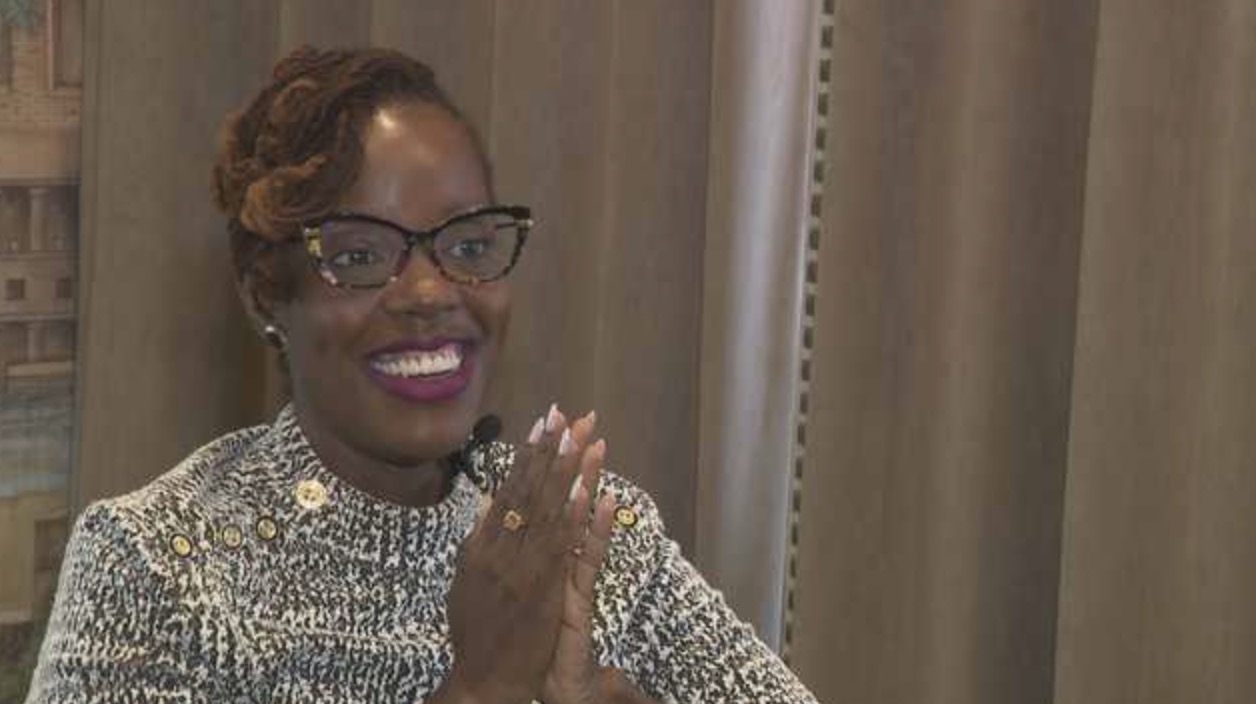Mississippi nonprofit leader receives national attention for program that helps moms

Aisha Nyandoro’s Springboard to Opportunities offers a number of community programs
By Megan West
Click here for updates on this story
JACKSON, Mississippi (WAPT) — The leader of a local nonprofit found herself on the cover of Time magazine last month for her work to help lift Black mothers out of poverty.
Aisha Nyandoro’s Springboard to Opportunities offers a number of community programs, but the one that caught the eye of Time provides extra cash to a select group of mothers each month for a year.
Nyandoro was between flights on a work trip when her colleague delivered the big news.
“My communications director called me crying. I was really like, ‘What happened? What’s going on?'” Nyandoro said. “And she was like, ‘You’re going to be on the cover of Time.’ And then I started crying.”
The Time editors selected Nyandoro as one of the magazine’s “100 Next,” a collection of rising stars in entertainment, sports, business and philanthropy. It’s a long way from where her journey with Springboard to Opportunities began.
“When we started in 2013, we were a small organization,” Nyandoro said. “We had a staff of one. It was me.”
The goal of the organization has always been to support Black mothers, quite literally providing them springboards to greater opportunity. But a few years in, she questioned whether their afterschool programs and other initiatives were effective. Only a few of the mothers the group served had been able to move out of low-income housing.
“And the reason that matters is because it matters to our families,” Nyandoro said. “Our families even dream of living in market-rate housing or homeownership. And we were saying that we actually weren’t helping them accomplish that.”
Nyandoro spent time researching the problem and talking to women.
“It’s not as if they said specifically, ‘Oh, we need money.’ That’s not what happens,” Nyandoro said. “But they did tell us stories about how complicated their lives were, about how they were stressed because their car had broken down. That their baby had made it to the next level of school, and they had to pay the registration fee. When we sat down and looked at the data, we said everything that our families are talking about are pieces that can be resolved with money.”
Nyandoro created the Magnolia Mother’s Trust, a guaranteed income program that provides $1,000 a month — no strings attached — to a select group of mothers in the low-income housing communities that the group serves. It’s all funded by donations.
“The first year, it was 20 moms, and we literally put names in a box, and we pulled the names out of the box in our office at the time,” Nyandoro said. “We have been successful to grow each year steadily since then.”
Catrina Kitchens is one of the mothers who was selected.
“I took the option to receive $700. The other $300 is in a savings account,” Kitchens said. “I was able to move out of low-income housing. Also, I purchased a vehicle. It also helped me with my bills.”
Kitchens works three jobs to provide for her 5-year-old daughter. She works in childcare, education and part-time at a restaurant. With the extra cash, she was able to get a reliable car, move to a safer place and make some memories.
“I’ve never been camping and I always wanted to do it. I was able to take her (daughter) camping on a trip. It was her first time and my first time going camping,” she said.
Kitchens received her last check from her year with the Magnolia Mother’s Trust in September.
“I have mentors. I still have that bridge to ask them for something. It’s still there,” Kitchens said.
Still, guaranteed income programs have critics. Some say they are unsustainable or encourage recipients not to work.
“I actually don’t respond to critics anymore,” Nyandoro said. “I don’t because I have come to realize that the data says something differently.”
Nyandoro said there are over 150 guaranteed income programs across the country now, and many of them are modeled after the Magnolia Mother’s Trust.
“The data shows that individuals, by and large, when they get a guaranteed income, they go about paying their bills. They go about moving to homeownership. They go about having additional opportunities for themselves and their families.”
Nyandoro is looking ahead. Checks will go out to the next group of mothers before the holidays.
Please note: This content carries a strict local market embargo. If you share the same market as the contributor of this article, you may not use it on any platform.


